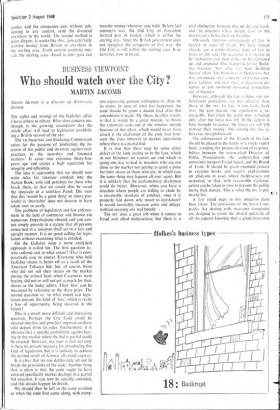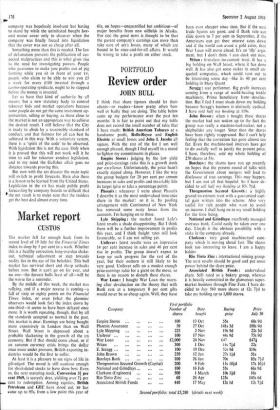Who should watch over the City?
BUSINESS VIEWPOINT MARTIN JACOMB
Martin Jaconzb is a director of Kleinwort, Benson.
The rights and wrongs of the Gallaher affair I leave others to debate. What does concern me,
though, is the growing assumption that the whole affair will lead to legislation establish- ing a British version of the SEC.
The us Securities and Exchange Commission exists for the purpose of 'protecting the in- terests of the public and investors against mal- practices in the securities and financial markets.' It came into existence thirty-four years ago and enjoys a high reputation for integrity and efficiency.
The idea is apparently that we should now write rules for takeover conduct into the Statute Book, with stiff penalties for those who break them, so that we would thus be saved the spectacle of a toothless Panel. The view that this 'would be a good thing' or (more pas- sively) is 'inevitable' does not deserve to have taken root so easily.
The problems of legislation and law enforce- ment in the field of commerce and finance are numerous. Imperfections abound and you can- not simply provide in a statute that all persons concerned in a takeover shall act in a fair and upright manner. It is no good calling for legis- lation without examining what is entailed.
On the Gallaher issue a more analytical approach is called for. The first question is: who suffered and to what extent? That is com- paratively easy to answer. Everyone who held Gallaher shares is better off as a result of the American Tobacco bid; but, of course, those who did not sell their shares on the market during the critical hour when Cazenoves were buying, did not or will not get as much for their shares as the lucky sellers. Their loss' can be
measured by reference to the share price. The second question is: to what extent can legis- lation prevent this kind of 'loss,' which is really a loss of opportunity, being incurred in the future?
This is a much more difficult and interesting question. Perhaps the City Code could be enacted into law and penalties imposed on those who depart from its rules. Furthermore, it is obvious that a specific prohibition against buy- ing in the market where the bid is partial could be enacted. However, my view is that not only is there no present necessity for introducing this kind of legislation, but it is unlikely to achieve the desired result of fairness all round anyway.
It is clear that no one deliberately set out to break the provisions of the code. Another thing that is plain is that the code ought to have covered specifically market dealings in a partial bid situation. It can now be suitably amended, and this should happen forthwith.
We should then be left in the same position as when the code first came along, with every-
one expressing genuine willingness to abide by its terms. In spite of what has happened, the code should be given a decent trial after this amendment is made. My thesis, in other words, is that it would be a great mistake to throw the voluntary code out of the window merely because of this affair, which would never have arisen if the draftsmen of the code had fore- seen the risks inherent in market operations where there is a partial bid.
It is true that there may be some other defect in the code staring us in the face, which in our blindness we cannot see and which is going one day to lead to investors who are not close to the market not getting as good a price for their shares as those who are; in which case the same thing may happen all over again. But it is unlikely that the parliamentary draftsmen could do better. Moreover, when you have a situation where people are willing to abide by a reasonable standard of conduct, once it is properly laid down, why resort to legislation? It would inevitably increase costs and delays, without securing any real benefit. .
The sEc does a great job when it comes to fraud and allied malpractices; but there is a
vital distinction between this, on the one hand, and the situation where people close to the market get a better deal, on the other.
Obviously rigorous enforcement of law is needed in cases of fraud We hale indeed already got a comprehensiw body of law in force to this end. On occasions it is shown to be ineffective and then it has to be tightened up and amended. This happened to the Build- ing Societies Acts after the State Building Society affair. The Protection of Depositors Act was introduced after a number of finance com- pany failures, and now there is legislation de- signed to put insolent insurance companies out of business.
However, although the law is there, our en- forcement procedures are less effecti%e than those of the sec. In fact, if one looks back over the past decade one conclusion is in- escapable. Too often the stable door is locked only after the horse has left. If the culprit is later brought to justice, the losers are still left without their money. The remedy for this is, however, straightforward.
The enforcement of this branch of the law should be placed in the hands of a single expert body, avoiding the present division of responsi- bilities between the overworked Director of Public Prosecutions. the understaffed and sometimes inexpert Fraud Squad, and the Board of Trade. It should be given extended powers to examine books and require explanations on affidavits in cases where malpractices are suspected, so that, with reasonable vigilance, action can be taken in time to prevent the public losing their money. This is what the SEC is pri-
11.1 marily for.
A few timid steps in this direction have been taken. The provisions of the latest Com- panies Act dealing with insurance companies are designed to avoid the absurd spectacle of all the experts knowing that a given insurance company was hopelessly insolvent but having to stand by while the uninitiated bought low- cost motor cover only to discover when the company was finally forced into liquidation that the cover was not so cheap after all.
Something more than this is needed. The law of defamation prevents the publication of sus- pected malpractices and this is what gives rise to the need for investigating powers. People who guarantee to make you profits out of pig farming while you sit in front of your TV, people who claim to be able to win you £5 a week for every £100 invested through a casino-operating syndicate, ought to be stopped before the money is invested.
Let us have that kind of authority by all means; but a new statutory body to control takeover bids and market operations because some people do not get the same investment op- portunities, selling or buying, as those close to the market is not an appropriate way to achieve the desired result. I still believe that the City is ready to abide by a reasonable standard of conduct, and that fairness for all can best be achieved in this way. With a voluntary system, there is a `spirit of the code' to be observed. With legislation this is not the case. Only when it is proved that this will not work will it be time to call for takeover conduct legislation, and to my mind the Gallaher affair goes no distance towards proving this.
But now with the AEI disaster the main topic will switch to profit forecasts. Here also there is a lesson to be learned from the United States. Legislation in the us has made public profit forecasting by company boards so difficult that the net result is to make sure that the insiders get the best deal almost every time.







































 Previous page
Previous page